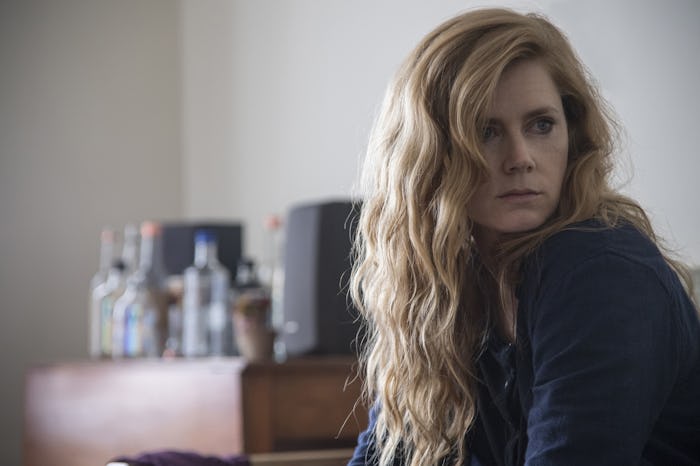Entertainment

Gillian Flynn Explores Female Anger In 'Sharp Objects'
Amy Adams stars in HBO's Sharp Objects as Camille, a crime reporter returning to her hometown to try and uncover the culprit behind a series of murders. It certainly sounds like a true crime series, but is Sharp Objects based on a true story?
The upcoming HBO series is not based on real events; instead, its source material is of the literary sort. The show is an adaptation of Gillian Flynn's novel of the same name, so fans of Gone Girl can expect the similar dark twists and ominous atmosphere when they tune into Sharp Objects on July 8. And while true crime aficionados might notice similarities between Flynn's work and real cases, no specific situation from the real world inspired her to write the novel. Instead, she had certain themes and ideas she wanted to explore, as she explained to Entertainment Weekly ahead of the show's premiere.
Flynn noticed that there weren't enough stories about "how women handled their anger and their violence and what that looked like," though plenty of stories examined that from a male perspective. That was what inspired her to write Sharp Objects, but she also found a way to work some personal details into the novel.
To The Hollywood Reporter, Flynn said:
I wrote Sharp Objects because I wanted to write a character study, and I hid that inside of a mystery. I tricked people into reading about women and violence and rage and what that looked like in three different generations of women. That's what I wanted to write about, and I figured out I could do it if I coated it in this yummy Southern Gothic mystery.
Camille was the lens through which Flynn could address all the topics she had wanted to write about in the first place, but a female antihero also proved to be a hard sell. Potential publishers weren't interested in the book simply because Camille wasn't "likable" enough. She wasn't a character someone could root for — though that had never been a problem for any of the countless unlikable male protagonists in literature. Ultimately, the book was published by Crown.
Flynn also used Sharp Objects to express some very personal things she was going through at the time. There are surface-level similarities between her and Camille (they have both been journalists, though that's really where the commonalities begin and end) but it seems like Camille was created more to explore Flynn's feelings than reflect her reality. Flynn didn't share Camille's tendency towards self-harm, but the inclusion of that in the novel came from a very real place. In the same interview with THR, Flynn said:
I'm a laugh-through-the-pain kind of person. I wrote Camille coming from a very, very dark place, a place of deep pain. The reason I wrote about the scars, about Camille writing on her skin, was because I felt that [misery] of, like, "Why can't anyone see how much pain I'm in?" I wished I could bear witness somehow. I had these fantasies of being mangled — of showing how much pain I was in.
While there was no specific case or actual person who provided the framework for Flynn to write Sharp Objects, there are a lot of very real details underneath its heightened, Southern Gothic exterior. Like many writers, Flynn used fiction to investigate relevant themes and feelings that she might not have been able to tackle otherwise. So while the novel and the HBO series are totally fictional, there are aspects of both that will resonate with audiences anyway. The emotions of Sharp Objects are authentic even if the source material is entirely invented.